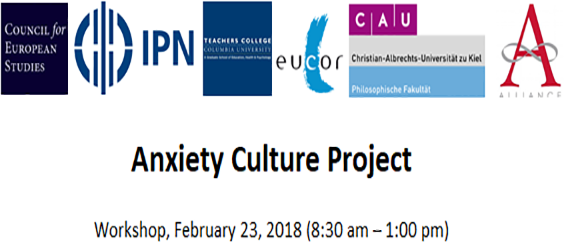Anxiety Culture Project
The Anxiety Culture Workshop convened on February 23, 2018. Twenty-nine attendees representing twenty-two institutions from throughout Europe and the United States attended the workshop. The workshop was part of the greater “Anxiety Culture Research Project” led by Ulrich Hoinkes, Center on Humanities in Education Kiel University in Germany, and John Allegrante, Teachers College Columbia University.
The Anxiety Culture Research Project focuses on the world’s most pressing and seemingly intractable problems presented through the lens of crisis. Stating that, perhaps crisis is not the right term to explain long‐term concerns such as: climate change and its consequences, health risks and the increasing prevalence of mental illness, massive migration and the ensuing disturbances in social and political orders, or the drastic changes in digital communication and the profound impact such change is having on global commerce, employment, and the prospects for security in our old age. Framing these challenges under the notion of “crisis” accelerates our thinking and lends a sense of urgency to our actions. However, this comes at the expense of a deeper, more nuanced understanding of the changing face of our societies. Thus, these situations should not be presented through the lens of crisis, but rather through that of “anxiety culture.” Understanding this term allows for fact‐driven discussions of these problems, revealing the affective dimension of this moment where facts often harbor deep emotional attachments that are strongly marked by anxiety and its consequences.
Anxiety culture is thus an attempt to resist the reductive jump towards solutions or definitive understandings, and rather a quest to develop a generative new set of conceptual categories for understanding and coping with the present moment. That is why during the workshop, attendees took part in think‐tanks defining the main content lines of the following clusters of research focus within the “Anxiety Culture Research Project”: Climate change, Health, Migration, and Technology.
This workshop and the larger project were made possible by the long-term collaboration between the School of Humanities (Philosophische Fakultät) of Kiel University, Germany, the German Leibniz-Institute for Science and Mathematics Education, attached to Kiel University, and Teachers College of Columbia University in NYC. Most recently in fall 2017, the project got important infrastructural support by being hosted as a continuous program line of the Council of European Studies (CES) at Columbia University, in collaboration with the Alliance Program. Furthermore, it has broadened its European connections by a collaborative agreement with Eucor- The European Campus, which is a partnership organization of five universities in Germany, Switzerland and France, running a Liaison Office in NYC.

